For those that soldiered through the football championship when there were no second chances, 2023 is a world removed. Each county this year, regardless of Sam Maguire or Tailteann Cup ambitions, is guaranteed at least four games.
After two decades, the concept of knockout qualifiers, such a shock to the long-standing traditional structure in 2001, is replaced by round-robin mini-groups.
The decision by the GAA to do away with the do-or-die straight knockout format had been mooted for a number of years before the turn of the millennium saw the final instalment of the football championship as we had known it.
For players who played either side of the turn of the millennium, it is the year before and after that are perhaps a little easier to recall.
Aodán MacGearailt was one of the promising crop of Under-21s blooded by Kerry manager Paidí Ó Sé, making his debut during the summer of 1999. What springs to mind as much as the Munster final defeat to Cork in monsoon like conditions, was the listless months that followed.
"I always remember that summer felt very long. I was deflated after the game, all the training and work that went in. It was a hollow feeling."
Ciarán Whelan's first two Leinster finals ended in defeat, but while the first in 2000, after a replay to Kildare, saw the end of the road for the Dubs, 12 months later was a different proposition entirely.
"It was a very strange environment going back for a qualifier to Sligo," he says of the game where the Raheny man bagged 1-02 in a comfortable victory in Croke Park.
"We were back training in Parnell Park the following Tuesday. It was extremely challenging for manager Tommy Carr at the time to really get us back on our feet."
If the GAA could have written the script for the final season of the straight knockout format, it’s unlikely it could have matched 2000 for drama, storylines and replays.
Surging Saffrons
In the bearpit of Ulster football, it was Armagh that prevailed for a second Anglo-Celt on the spin, but from a neutral's perspective, Antrim were the story of the provincial championship.
"We were fed up with the straight knockout format and looking forward to getting that second chance," former Antrim forward Kevin Brady says, reflecting back on that time.
Ironically, the Saffrons enjoyed a marked upturn in fortunes in knockout football’s swansong.
After waiting 18 years for a win in Ulster, they almost enjoyed two in the space of a memorable month.
There were scenes of unbridled joy as Down were defeated in the quarter-finals, but once those celebrations died down, it was the prospect of tackling league champions Derry that sharpened the focus.
David versus Goliath, with David bidding for a first Ulster final in 30 years.
The star-studded opposition held extra significance for Brady.
His club Moneyglass is close to the border, and his schooling was in Derry. Indeed he went to primary school with Derry wing-back Paul McFlynn, while defender Sean Marty Lockhart, who picked Brady up for a period during the game, was a fellow pupil of St Patrick’s Maghera.
On a special day in Casement Park, Antrim refused to wilt in the summer sun, with Brady’s two goals crucial as they fought back to earn a draw. And it was inches from being one of the great giant-killings.
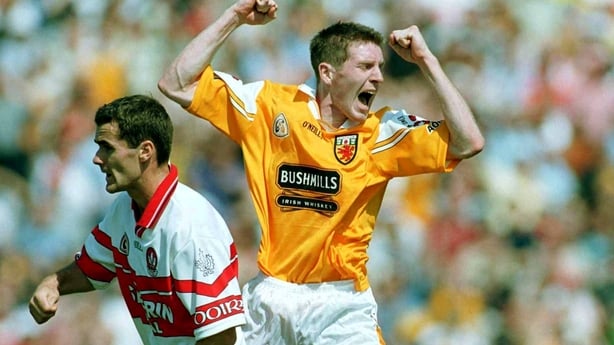
Antrim trailed by three in the closing stages when Brady slipped inside Kieran McKeever for his second green flag to send the home supporters wild, and from the resulting kickout, he sought to nudge his side in front.
Once again McKeever, who would end the season as an All-Star, was left scrambling, but Brady screwed his effort right of the posts.
"Everybody remembers the goals, but I tend to remember that miss as it was quite an easy chance. We would have been in dreamland if we had gone ahead."
There was still time for one final act in an absorbing encounter.
Shenny McQuillan had dispatched three frees already when he lined up a match-winning opportunity in injury-time.
Some 55 metres out from goal, the Antrim fans could barely watch as it sailed high, but on its way down in front of the crossbar, was met by Derry talisman Anthony Tohill.
The 6ft 4 inch midfielder stretched out every sinew of his frame to deny Antrim a most famous win.
"Only a player with his super-human capacities could pull it off," Cliona Foley wrote in her Irish Independent report.
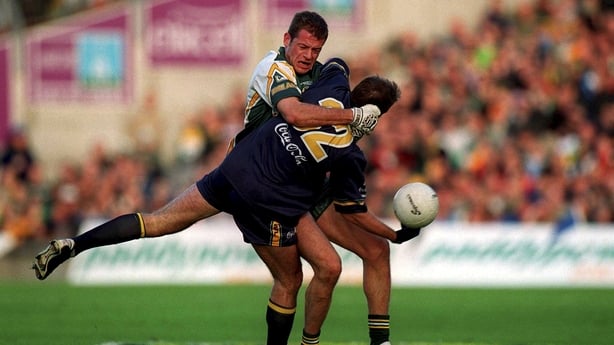
With that warning shot, Eamon Coleman’s side were ruthless second time out. Gary Coleman was assigned marking duties on Brady and Derry eased to a nine-point win.
"The way Derry took the field was instructive," recalls Brady. "Tohill led the team out of Casement with purpose and there was a sense there was going to be no messing."
In the decider, Derry were looking to reclaim the Anglo-Celt they surrendered to Armagh 12 months previous.
A young Stevie McDonnell was in his second year with Armagh, but his first as a starter. A couple of points each against Tyrone and Fermanagh meant he was already catching the eye of the opposition, with Coleman detailing Mr Reliable Coleman to track the Killeavy sharpshooter.
"I was 20," McDonnell tells RTÉ Sport. "To see an All-Ireland winner coming to pick you up showed I made some kind of impression."
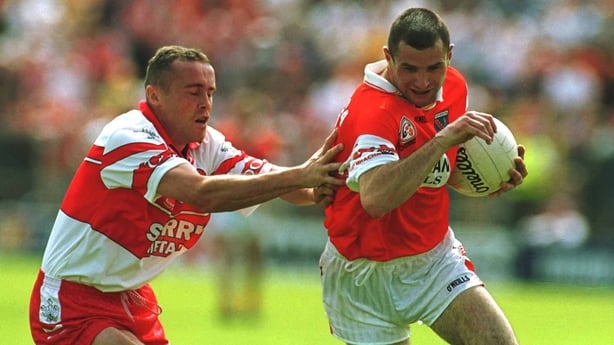
His first championship goal, in a game ultimately decided by a point, reinforced his growing reputation.
Captain Kieran McGeeney drove forward through the middle before hoisting the ball to Barry O’Hagan. McDonnell took the lay-off and finished with the composure of an experienced campaigner.
"It was one of them shots, when you connect well with it, it just goes in the roof of the net. It looked good going in off the post."
There was still time for another match-defining play from Tohill. This time it was the Swatragh man, who would end the year with a fourth and final All-Star, who was standing over the long-distance free looking to salvage a second day out.
The kick didn’t lack conviction, but the requisite accuracy was missing. The ball had barely drifted wide when referee Michael Curley brought an end to proceedings.
Tribes rule the roost
A fortnight after Antrim caused a ripple against Down, Sligo made a serious splash in Connacht.
Few gave the Yeats County a chance given Mayo had been to couple of All-Ireland finals in the previous four years and were seeking back-to-back titles in Connacht.
Galway, who sandwiched those Mayo final appearances by landing Sam Maguire in 1998, were expected to be their main challenger, but that joust never came to pass after Sligo upset the odds at Markievicz Park to end a century of championship hurt against the green and red.
Erratic shooting – 13 wides in total – and the dismissal of James Horan for an off-the-ball incident in the 51st minute didn’t help their cause, with Ken Killeen and Paul Taylor causing the most damage on the scoreboard.
Hopes of another scalp were rutlhessly put to bed by Galway in the next round, where the half-time scoreline read 0-14 to 0-00.
Dessie Sloyan opened their account in the 39th minute, with only three more points to follow in a sobering 70 minutes.
With Leitrim edging out Roscommon in the semi-final, it resulted in a comfortable Connacht title for the Tribesmen, where midfielder Kevin Walsh came on for a late cameo.
A groin injury hampered his early summer preparations, but those couple of minutes had value for the Killannin man.
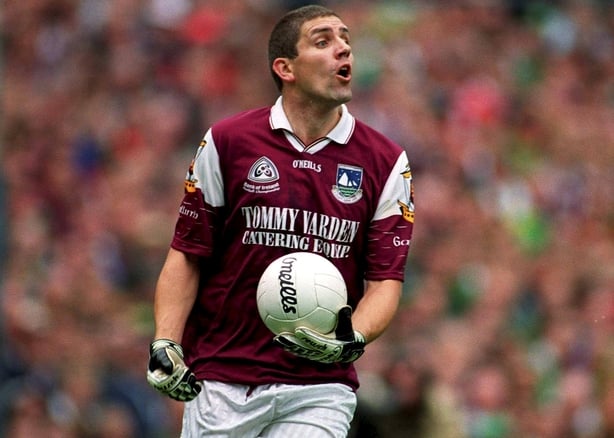
"I jumped for a ball and I was nearly afraid to jump because of the groin," he said. "I missed the ball by a yard, but I jumped hard, landed hard, and that gave me confidence."
Lillies land Leinster after Dubs’ demise
In contrast to an uncompetitive Connacht, Leinster was the other end of the spectrum.
The preceding five years had seen four sides claim the Delaney Cup, with three of them on the opposite side of the draw to Tommy Carr’s Dublin.
Kildare accounted for Meath and Offaly, before locking horns with the Dubs in one of the games of the season.
The Lillies began brightly before Dublin thundered into the game. Level at the break, Tadhg Fennin looked to have won the game only for Collie Moran to bear down on goal at the other end.
The fans in blue were longing for a first Leinster title in five years, but Moran played the percentages and took his handy point.
Thirteen days later, despite trailing by six points at the interval, Mick O’Dwyer’s men finished the job off.
Kildare hadn't scored two goals against Dublin in the championship since 1977, but they matched that tally in less than two dramatic second-half minutes through Dermot Earley and Tadhg Fennin.
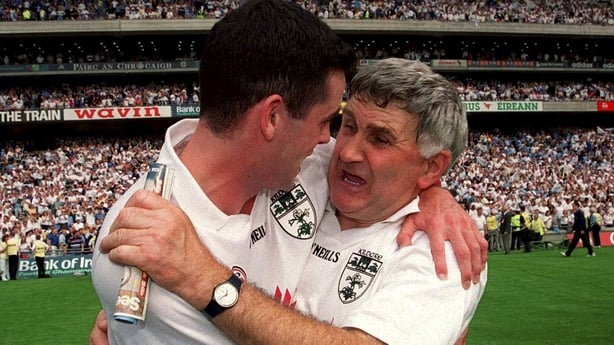
A Collie Moran free was all Dublin had to show for their second-half efforts.
"We shouldn’t have lost the replay," laments Whelan. "We played blistering football in that first half and put ourselves in a really good position.
"They got momentum at a crucial time and we struggled to get back on track."
Kerry tyros come good
The picture in Munster was one of a competitive rivalry between neighbours Cork and Kerry.
Boosted by the return of the mercurial Colin Corkery and centre-back lynchpin Steven O’Brien, the Rebels were looking to atone for the previous September’s All-Ireland final defeat to Meath.
With an unseeded draw, the 'final’ for all intents and purposes occurred at the semi-final stage, where Fitzgerald Stadium was the venue.
"In 2000, the fear of losing was greater than the joy of winning. You were playing with a nervous energy," says MacGearailt.
A host of players that would backbone Kerry’s future success were being meshed in with some more experienced pros, most notably Darragh Ó Sé and Seamus Moynihan.
In an era before the ubiquitous use of the word culture regarding sports teams, they had it in abundance.
"They weren’t just leaders on the pitch, they knitted the younger lads in," MacGearailt says.
With the tar melting under the players feet as they made their way to the pitch, it was the home side that scorched ahead, a couple of Dara Ó Cinnéide penalties powering them to a 2-09 to 0-05 interval lead.
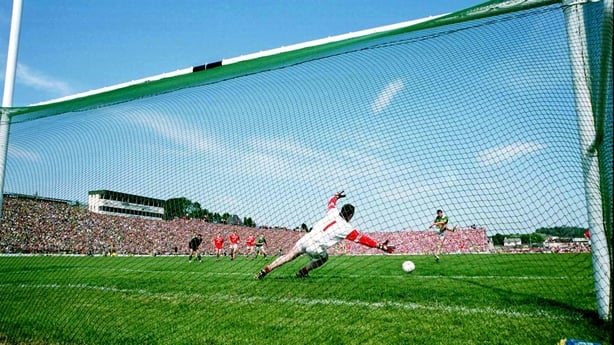
Ronan McCarthy was in the Cork full-back line tasked with shackling Ó Cinnéide, Johnny Crowley and Mike Frank Russell, but the goals were a killer.
"They were soft penalties," says the Douglas man. "Would they have been given at the other end? I’m not so sure."
An inspired Corkery (1-08) led the charge back, but the Kingdom saw the game out.
"You’d wonder what we could have done with Colin in the team in 98 and 99," McCarthy says. "He was the most talented player I ever saw."
Then there were four
Even by the lofty standards of the 2000 season, the drawn semi-final between Kerry and Armagh was arguably the pick of the bunch.
The Orchard County finished the game like a train, Andrew McCann’s goal levelling matters before McGeeney looked to have kicked the Orchard County into a first decider since 1977.
"I was thinking, Jesus Christ, out of nowhere we could find ourselves in an All-Ireland final here," says McDonnell, now in a sideline watching brief.
Maurice Fitzgerald however, used all summer as a finisher before it was ever a fashionable term, had the last say, coolly slotting over a free in the fourth-minute of injury-time.
Yet it was his 57th minute goal that lives longest in the memory, the Cahirciveen wizard at his very best.
Taking the ball on the run, he brushed past the first tackle, took a hop before a right foot solo followed by a left foot finish. And all with majestic grace.
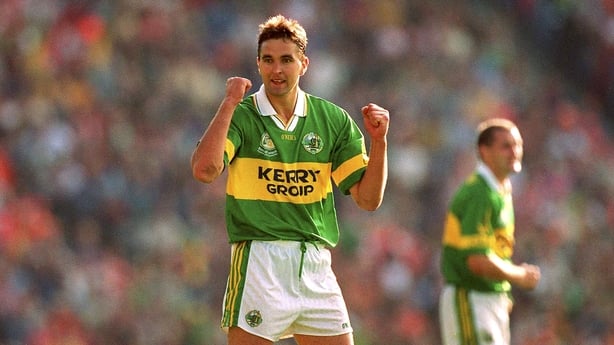
"Pure Maurice," says MacGearailt.
The replay was a see-saw affair, McConville’s drilled shot before the break again looking to be a potentially decisive moment, but they couldn’t shake the Munster men off, Mike Frank Russell’s extra-time goal the difference at the end.
McDonnell has contrasting memories of the two-game saga.
Whipped off shortly after the interval of the drawn encounter, unable to escape the clutches of Mike McCarthy, he was sacrificed by joint managers Brian McAlinden and Brian Canavan for the fit-again Diarmuid Marsden.
"I felt there was no way I should have been dropped. I was in the running for Young Player of the Year, so 40 minutes of bad football to me didn’t justify being dropped.
"I was the easy pickings. I just knew it was going to happen. I think I redeemed myself in the replay (he hit 0-02 and forced Declan O’Keeffe into an important save).
"The learnings I got that day stood for me for the rest of my career."
In 13 years in the Armagh jersey, it would prove to be the first and last time McDonnell would be hooked in the heat of championship battle.
In the other semi-final, Kildare were unable to exact any semblance of revenge to Galway for their '98 final defeat, the Tribesmen taking the spoils amid torrential downpours.
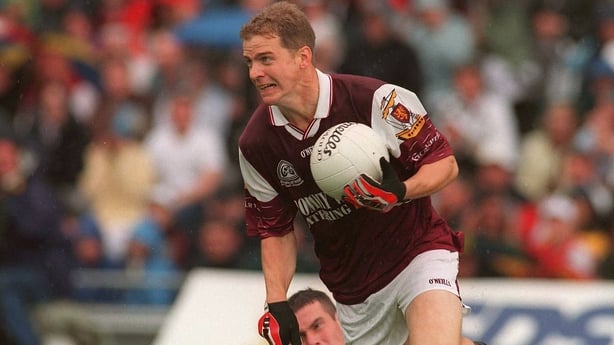
The Lilywhites managed to effectively tie up four of the six starting Galway forwards, but the problem was that Padraic Joyce and Michael Donnellan were simply unplayable.
"Donnellan and Joyce were like a pair of ice skaters gliding across the greasy surface showing magnificent control," Colm Keys wrote in his match report.
Donnellan dictated matters from deep, picked off a couple of points, while Joyce dominated aerially and intellectually while contributing (0-7, 0-4f) almost half of Galway’s tally.
Walsh however still couldn’t command a starting berth under John O’Mahony.
"I could have started that game, I was going really well in training," though he certainly made a positive impression when called in to replace Seán Ó’Domhnaill in the early stages.
Had he done enough to start the decider?
The final
The traditionalists could be pleased with their lot. As well as two supremely gifted sides set to battle it out for Sam, it was a proud day for the Irish-speaking community.
An Ghaeltacht provided MacGearailt, the Ó Sé brothers and Dara Ó’Cinnéide, while on the other side of the ropes, Ó’Domhnaill and Seán Óg de Paor were flying the flag for An Cheathrú Rua, the pair having grown up 200 yards apart on Bóthar An Chillín.
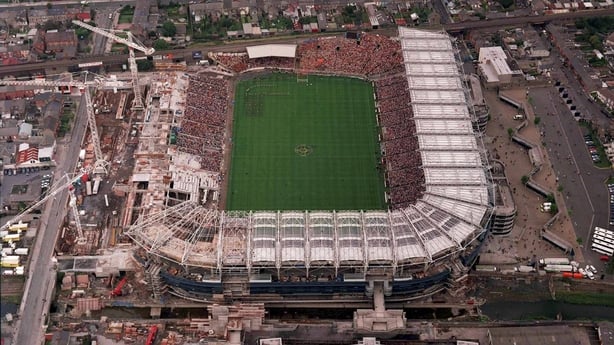
Kerry dictated the terms of engagement as once again Walsh failed to force his way into the starting XV.
With the Kingdom racing into an early lead, the Killannin man was introduced and contributed a point.
"I had been playing so long, I genuinely expected to be coming on."
Joyce claimed the final score of the game as the sides shared 28 points, while Walsh had done enough to earn his first championship start, getting the nod ahead of Joe Bergin.
The replay was lit up after just six minutes when Declan Meehan scored a goal for the ages. MacGearailt was on the opposite side as he watched Paul Clancy’s pinpoint over the shoulder pass for the marauding wing-back to finish in style.
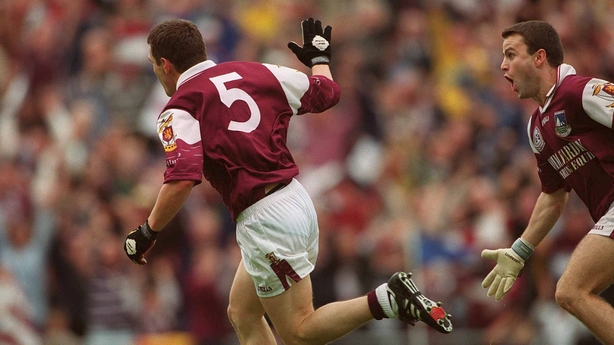
"Clancy was under pressure turning, he was turning and kicking at the same time. To land that into his path without breaking stride…and then the super finish."
Disaster struck after just 17 minutes when, with Galway in the ascendancy, Walsh was forced off injured and the pendulum swung.
Kerry went in at the break two ahead. They shot six consecutive wides after the break, but they clearly had the upper hand.
With Fitzgerald exerting a huge influence as a third midfielder, the Tribesmen pitched Walsh back in the stem the tide.
The Kingdom closed out the final 20 minutes outscoring their opponents by five points, with MacGearailt finishing with 0-03 beside his name.
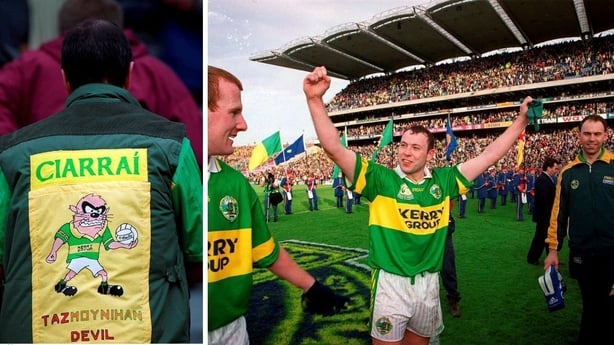
"That Galway team were extremely skillful," MacGearailt says. "There was nothing between those two teams. If they had Ja Fallon (absent with a cruciate injury), they might have beat us. He was a big loss."
What set Kerry apart? For all their talent, the driving force of Seamus Moynihan, later crowned Footballer of the Year, may well have tipped the scales.
"Not only did he fill the full-back slot with Barry O’Shea injured, he was probably starting most of our attacks," MacGearailt says.
"At a time when full-backs didn’t really attack he was driving out as far as midfield. He wasn’t a tall guy, but he played tall. He gave an exhibition that year."
Then and now
Having served his time as both player and manager for Cork, Ronan McCarthy says the new format has a better ratio of training to games, which is the number one priority.
"It’s important that players get more championship games in the summer when you should be playing football."
For all the undoubted positives to the structure in place this year compared to the turn of the millennium, McDonnell can’t help but feel the added games dilutes something special for fans and players alike.
Our games were littered with mistakes, but they were highly entertaining because of that
"There was always a different kind of energy around a team, always a great atmosphere from the crowds," he says. "It was turn up and perform, or good-bye.
"Only from the All-Ireland quarter-finals this year will we see the real championship intensity."
Whelan has already spoken of his belief that the new format is likely to spell the beginning of the end for the provincial championships, while MacGearailt agrees that while the skill and fitness levels have never been so high, it doesn’t necessarily correlate with the excitement.
"Obviously our games were littered with mistakes, but they were highly entertaining because of that. We didn’t have the composure at the time.
"Now, possession is king, going over and back the pitch. It’s very controlled. Our games were manic and we fed off the crowd. It’s just the way football was."
Watch Mayo v Roscommon in the Connacht Football Championship on Sunday from 3.15pm on RTÉ2 and RTÉ Player, follow a live blog on RTÉ.ie/Sport and the RTÉ News app or listen to live commentary on RTÉ Radio 1
Watch highlights of all the weekend's championship football and the Allianz Hurling League final on The Sunday Game, RTÉ2 and RTÉ Player, 9.30pm


